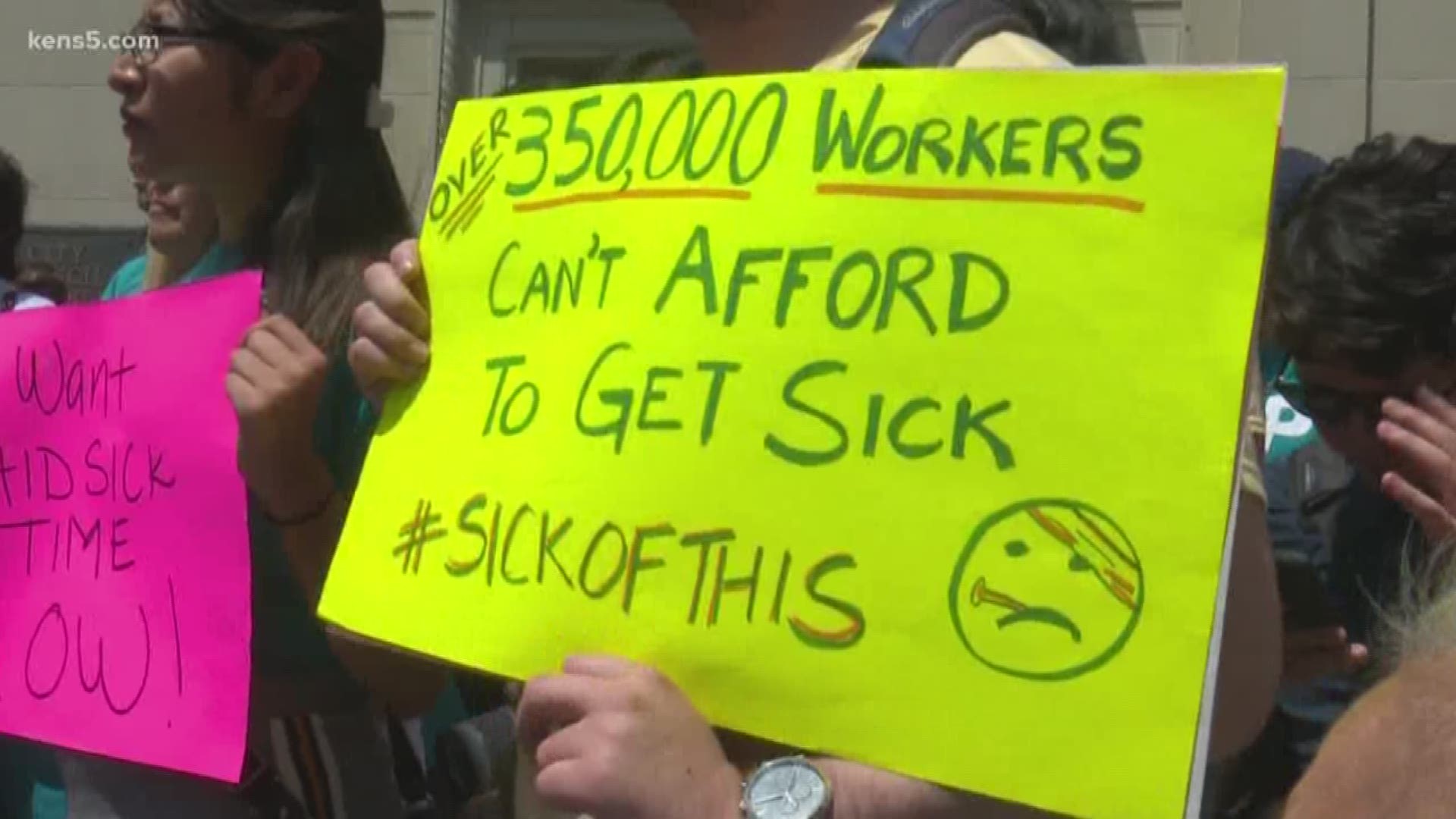On Thursday, San Antonio City Council approved an initiative that could compel employers to provide paid sick time, but there are still variables that could kill the idea.
A jubilant crowd reacted to the passage of the measure by city council. The vote was 9-2 in favor of passing the measure.
Those who worked to collect the petition signatures that forced city council to either pass the measure as proposed or put it on the November ballot said that the victory is hard-fought and sweet.
“We make sure we’re more productive at work, that our children are taken care of, and that we all get the health care that we need,” organizer Joleen Garcia said.
Passionate speakers shared their thoughts with council for hours, with many in the business community saying mandating the benefit is bad for business.
Speaking on behalf of the 1,200 members of the Hispanic Chamber of Commerce, Ramiro Cavazos told city council that even though having a healthy workforce is vital, the details of coverage are a matter that should be left between employees and their employers.
Several council members are concerned the proposal does not align with state law.
Councilman Greg Brockhouse told the crowd "We are way out of line."
After the vote, Councilman Brockhouse issued the following statement about his position.
“City Council continues to overstep its boundaries and enact policies that are beyond the role of City government. We should not be telling business owners how to run their companies, pay for their employees or what benefits to offer. City Council enacting the Paid Sick Leave ordinance puts small businesses and their employees at risk. Every dollar counts in the small business world and it is unfortunate City Council elected to implement Paid Sick Leave and bypass a public vote. City Hall needs to think about the laws we pass and the messages they send. Enacting Paid Sick Leave by a Council vote continues a long line of questionable City Council actions that are clearly telling businesses, both local and those looking to relocate to San Antonio, that City Hall is anti-business. City Hall doesn’t create jobs or wealth, but we can sure kill growth and hurt businesses with overregulation and we showed that today.”
Councilman Manny Pelaez told the crowd he would vote to approve the measure, but even to the sound of applause, he warned everyone his support is tempered by the thought that the proposal will not stand legal challenges.
Pelaez issued this statement:
“Paid sick leave is a laudable goal. I understand the problem faced by workers who find themselves in a catch-22 situation of being sick, needing to recover, and not getting paid. I also understand our business community’s concerns with government overreach and the imposition of more costs.
However, before considering these competing positions, we have to look at existing state and federal law, the likelihood of success if the ordinance is challenged in court, and the likelihood that placing this ordinance on the ballot will muddy the waters when it comes to a full-throated conversation about the firefighters’ three referenda items.
Simply put, this ordinance is preempted by state statute and the Texas constitution. The Texas Labor Code and the Constitution are not vague when it comes to whether cities can regulate how, when, and how much employers pay their employees. No matter how badly we wish it were easier for municipalities to insert themselves in the employer/employee relationship, the law doesn’t allow it.
Because of the preemption, I am convinced that the legislature will be moving very quickly to address this once and for all.
My preference is to see the legislature take this on as quickly as possible, so they can settle this debate once and for all. More importantly, however, the ballot should be preserved for something that merits a thorough debate -- the three firefighter resolutions.
Over the next six months, I’ll be working with our business community to better analyze the costs associated with this ordinance and the impediments it may present to our economic development efforts. We also must work to develop fixes to this ordinance and put those up for consideration by this counsel. We still don’t know how we’re going to get this implemented. We currently don’t have the tools or the in-house expertise to make this ordinance work. We’ve received no information as to the costs of implementing it, the impact this will have on our budgeting, the staffing requirements, or the communications plan. It’s very possible that the ordinance you see today will look different in six months because of the fixes we’ll have to make.”
If there are no successful challenges at the state or federal level, the measure could take effect January 1.

